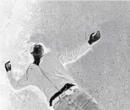With fingers weary and worn,
With eyelids heavy and red,
A woman sat, in unwomanly rags,
Plying her needle and thread—
Stitch! stitch! stitch!
In poverty, hunger, and dirt,
And still with a voice of dolorous pitch
She sang the “Song of the Shirt.”
“Work! work! work!
While the cock is crowing aloof!
And work—work—work,
Till the stars shine through the roof!
It's Oh! to be a slave
Along with the barbarous Turk,
Where woman has never a soul to save,
If this is Christian work!
“Work—work—work
Till the brain begins to swim;
Work—work—work
Till the eyes are heavy and dim!
Seam, and gusset, and band,
Band, and gusset, and seam,
Till over the buttons I fall asleep,
And sew them on in a dream!
“Oh, Men, with Sisters dear!
Oh, Men, with Mothers and Wives!
It is not linen you're wearing out,
But human creatures' lives!
Stitch—stitch—stitch,
In poverty, hunger, and dirt,
Sewing at once with a double thread,
A Shroud as well as a Shirt.
But why do I talk of Death?
That Phantom of grisly bone,
I hardly fear its terrible shape,
It seems so like my own—
It seems so like my own,
Because of the fasts I keep;
Oh, God! that bread should be so dear,
And flesh and blood so cheap!
“Work—work—work!
My Labour never flags;
And what are its wages? A bed of straw,
A crust of bread—and rags.
That shatter'd roof—and this naked floor—
A table—a broken chair—
And a wall so blank, my shadow I thank
For sometimes falling there!
“Work—work—work!
From weary chime to chime,
Work—work—work!
As prisoners work for crime!
Band, and gusset, and seam,
Seam, and gusset, and band,
Till the heart is sick, and the brain benumb'd,
As well as the weary hand.
“Work—work—work,
In the dull December light,
And work—work—work,
When the weather is warm and bright—
While underneath the eaves
The brooding swallows cling
As if to show me their sunny backs
And twit me with the spring.
Oh! but to breathe the breath
Of the cowslip and primrose sweet—
With the sky above my head,
And the grass beneath my feet
For only one short hour
To feel as I used to feel,
Before I knew the woes of want
And the walk that costs a meal!
Oh! but for one short hour!
A respite however brief!
No blessed leisure for Love or Hope,
But only time for Grief!
A little weeping would ease my heart,
But in their briny bed
My tears must stop, for every drop
Hinders needle and thread!”
With fingers weary and worn,
With eyelids heavy and red,
A woman sat in unwomanly rags,
Plying her needle and thread—
Stitch! stitch! stitch!
In poverty, hunger, and dirt,
And still with a voice of dolorous pitch,—
Would that its tone could reach the Rich!—
She sang this “Song of the Shirt!”
With eyelids heavy and red,
A woman sat, in unwomanly rags,
Plying her needle and thread—
Stitch! stitch! stitch!
In poverty, hunger, and dirt,
And still with a voice of dolorous pitch
She sang the “Song of the Shirt.”
“Work! work! work!
While the cock is crowing aloof!
And work—work—work,
Till the stars shine through the roof!
It's Oh! to be a slave
Along with the barbarous Turk,
Where woman has never a soul to save,
If this is Christian work!
“Work—work—work
Till the brain begins to swim;
Work—work—work
Till the eyes are heavy and dim!
Seam, and gusset, and band,
Band, and gusset, and seam,
Till over the buttons I fall asleep,
And sew them on in a dream!
“Oh, Men, with Sisters dear!
Oh, Men, with Mothers and Wives!
It is not linen you're wearing out,
But human creatures' lives!
Stitch—stitch—stitch,
In poverty, hunger, and dirt,
Sewing at once with a double thread,
A Shroud as well as a Shirt.
But why do I talk of Death?
That Phantom of grisly bone,
I hardly fear its terrible shape,
It seems so like my own—
It seems so like my own,
Because of the fasts I keep;
Oh, God! that bread should be so dear,
And flesh and blood so cheap!
“Work—work—work!
My Labour never flags;
And what are its wages? A bed of straw,
A crust of bread—and rags.
That shatter'd roof—and this naked floor—
A table—a broken chair—
And a wall so blank, my shadow I thank
For sometimes falling there!
“Work—work—work!
From weary chime to chime,
Work—work—work!
As prisoners work for crime!
Band, and gusset, and seam,
Seam, and gusset, and band,
Till the heart is sick, and the brain benumb'd,
As well as the weary hand.
“Work—work—work,
In the dull December light,
And work—work—work,
When the weather is warm and bright—
While underneath the eaves
The brooding swallows cling
As if to show me their sunny backs
And twit me with the spring.
Oh! but to breathe the breath
Of the cowslip and primrose sweet—
With the sky above my head,
And the grass beneath my feet
For only one short hour
To feel as I used to feel,
Before I knew the woes of want
And the walk that costs a meal!
Oh! but for one short hour!
A respite however brief!
No blessed leisure for Love or Hope,
But only time for Grief!
A little weeping would ease my heart,
But in their briny bed
My tears must stop, for every drop
Hinders needle and thread!”
With fingers weary and worn,
With eyelids heavy and red,
A woman sat in unwomanly rags,
Plying her needle and thread—
Stitch! stitch! stitch!
In poverty, hunger, and dirt,
And still with a voice of dolorous pitch,—
Would that its tone could reach the Rich!—
She sang this “Song of the Shirt!”
envoyé par Bernart Bartleby - 17/11/2017 - 09:23
×
![]()






Versi di Thomas Hood (1799-1845), poeta londinese
Pubblicati anonimamente sul settimanale “Punch; or, The London Charivari”, su cui Hood regolarmente pubblicava, nell’edizione del Natale 1843.
Thomas Hood in questa sua poesia raccontò la storia vera della signora Biddell, una sarta rimasta vedova con figli ancora piccoli, una famiglia che viveva in condizioni miserabili. In base ad una pratica di sfruttamento semi-schiavistico assai praticata all’epoca, e che nessuno metteva in discussione, la signora Biddell cuciva capi di abbigliamento a casa sua ed il padrone le forniva il materiale necessario, imponendole un salato deposito. La Biddell – e con lei una miriade di lavoratori e lavoratrici di allora - pur lavorando tutto il giorno, non era nemmeno in grado di sopperire alla cauzione e finì così con l’indebitarsi ed essere condannata sostanzialmente ai lavori forzati. Spedita in una workhouse, di lei e del destino dei suoi figli non è dato sapere.
Tuttavia la poesia di Thomas Hood, benchè lui non fosse politicamente un radicale, contribuì non poco alla consapevolezza generale sulle inumane condizioni di vita e di lavoro della classe operaia, alimentando la popolarità del sindacalismo e la spinta verso leggi più severe a protezione dei lavoratori.
Nel 1908 la triste vicenda della signora Biddell raccontata da Hood fu portata sul grande schermo da David Wark Griffith, il padre del cinema americano (en.wikipedia)